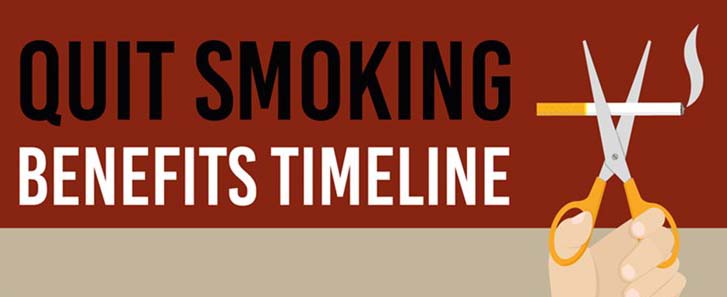The Benefits of Quitting Smoking Timeline
At [Your Company Name], we understand the importance of quitting smoking for your overall health and well-being. Quitting smoking is a courageous decision that can have numerous positive effects on your body and mind. In this article, we will explore the benefits of quitting smoking and provide you with a comprehensive timeline of what you can expect during your journey to becoming smoke-free.
Immediate Effects (Within 20 Minutes)
As soon as you put out your last cigarette, your body begins to experience positive changes. Within just 20 minutes, your heart rate and blood pressure start to decrease, and your circulation improves. This immediate effect reduces the risk of heart attack and stroke.
Within 8 Hours
After approximately 8 hours of being smoke-free, the carbon monoxide levels in your blood drop, allowing your oxygen levels to return to normal. This increase in oxygen promotes better lung function and enhances your overall energy levels.
Within 48 Hours
Within 48 hours, your sense of taste and smell begin to improve. You may notice that food tastes better and smells more vibrant. This positive change can enhance your enjoyment of eating and lead to healthier food choices.
Within 72 Hours
Within 72 hours, your bronchial tubes relax, making it easier to breathe. The risk of coughing, wheezing, and shortness of breath decreases significantly. Your lung capacity starts to increase, allowing you to engage in physical activities with greater ease.
Within 2 Weeks to 3 Months
Between 2 weeks and 3 months, your circulation continues to improve, and your lung function increases by up to 30%. This improvement reduces the risk of respiratory infections and enhances your overall endurance. You may also experience less coughing and shortness of breath.
Within 1 to 9 Months
Within 1 to 9 months, the cilia in your lungs start to regain normal function. The cilia are small hair-like structures that help sweep mucus and debris out of your airways. As they recover, they can better protect your lungs from infections, reducing the risk of illnesses such as bronchitis.
Within 1 Year
After 1 year of being smoke-free, your risk of coronary heart disease is reduced by half compared to a current smoker. This significant risk reduction is due to the healing of your cardiovascular system and the elimination of harmful toxins from your body.
Within 5 Years
Within 5 years, your risk of stroke is similar to that of a non-smoker. Continued abstinence from smoking allows your body to repair and rejuvenate, significantly reducing the risk of various smoking-related diseases.
Within 10 Years
After 10 years of not smoking, your risk of lung cancer decreases by about 50% compared to a current smoker. Additionally, the risk of other smoking-related cancers, such as those affecting the mouth, throat, esophagus, bladder, kidney, and pancreas, also decreases.
Within 15 Years
After 15 years, your risk of coronary heart disease is similar to that of a non-smoker. Your body has undergone extensive healing, and the damage caused by smoking has been significantly repaired. Congratulations on achieving this milestone!

Quitting smoking is a challenging but incredibly rewarding journey. By understanding the timeline of benefits, you can stay motivated and focused on the positive changes happening within your body. Remember, support from friends, family, and healthcare professionals can greatly increase your chances of successfully quitting smoking.
Frequently Asked Questions
1. What are the benefits of quitting smoking?
The benefits of quitting smoking include improved lung function, reduced risk of heart disease and cancer, increased energy levels, and improved sense of taste and smell.
2. Is there a specific timeline for experiencing the benefits of quitting smoking?
Yes, there is a general timeline for experiencing the benefits of quitting smoking. Most of the benefits start to appear within the first few days and continue to improve over time.
3. How soon after quitting smoking will my lung function improve?
Within 2-3 weeks of quitting smoking, your lung function will start to improve. Over time, your lungs will become healthier and more efficient at removing toxins.
4. Will quitting smoking reduce my risk of heart disease?
Yes, quitting smoking significantly reduces the risk of heart disease. Within a year of quitting, your risk of heart disease drops by half compared to a smoker.
5. Can quitting smoking lower my risk of cancer?
Absolutely. Quitting smoking lowers your risk of various types of cancer, including lung, throat, mouth, and esophageal cancer. The longer you stay smoke-free, the more your risk decreases.
6. How long does it take for my energy levels to improve after quitting smoking?
Within a few days of quitting smoking, you may start to notice an increase in your energy levels. As your body recovers from the harmful effects of smoking, you will have more energy and stamina.
7. Will quitting smoking improve my sense of taste and smell?
Yes, quitting smoking can improve your sense of taste and smell. Within a few weeks of quitting, you may notice that food tastes better and your sense of smell becomes more sensitive.
8. Are there immediate benefits to quitting smoking?
Yes, there are immediate benefits to quitting smoking. Within 20 minutes of quitting, your heart rate and blood pressure start to decrease. After 8 hours, the carbon monoxide levels in your blood drop to normal.
9. How long does it take for the coughing to stop after quitting smoking?
For most people, the coughing associated with smoking will improve within a few weeks to a few months after quitting. However, it may vary depending on individual circumstances.
10. Can quitting smoking improve my overall health and quality of life?
Absolutely. Quitting smoking has numerous health benefits and can greatly improve your overall quality of life. It reduces the risk of various health conditions, improves physical fitness, and enhances your mental well-being.




